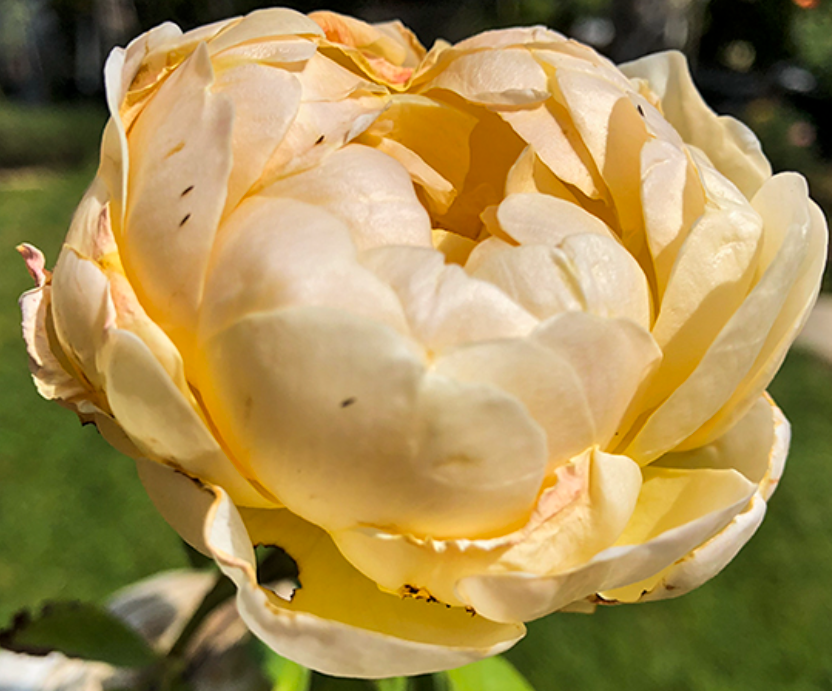
THRIPS ON A ROSE
Have you ever had issues with non-beneficial insects? Well, we have had issues, but neem oil seemed to keep the majority of them at bay. We typically use neem oil to take care of aphids and rose slugs. This year saw an exceptionally warm and dry spring that allowed a new pest to take hold in our garden, thrips. These little buggers did extensive damage to one of our newer rose plants that was acquired last year. All the new growth was severely distorted and the foliage dropped multiple times in a very short amount of time. I was concerned the rose plant would die after seeing this damage take hold. I investigated briefly and asked the advice of master rose growers, Wendy and Ryan Tilley, and they communicated that neem oil would not be enough to deal with the buggers.
I quickly began to change my spraying tactics after that conversation. The thrips were beginning to spread to other plants and the damage was becoming highly visible. I decided to try a new spray, Natria Insecticidal Soap. Natria Insecticidal Soap is a biologically-derived pest control agent designed for precision targeting of soft-bodied arthropods. Its active ingredient, potassium salts of fatty acids, disrupts the cellular integrity of target pests such as aphids, mites, and whiteflies by dissolving their waxy cuticle layers, leading to desiccation (loss of moisture) and mortality. This formulation ensures rapid knockdown of pests with a minimal ecological footprint, making it suitable for integrated pest management programs. Natria Insecticidal Soap is compatible with organic farming practices, exhibiting low phytotoxicity and negligible persistence, thereby preserving beneficial insect populations and maintaining overall plant health.
We sprayed all of our roses and then sprayed again three days later to ensure that any rebound in pest populations was dealt with effectively. We followed up with a different spray eight days later. This time we opted for Captain Jack’s Deadbug Brew. Captain Jack’s Deadbug Brew is an advanced insecticidal formulation utilizing spinosad, a naturally occurring soil bacterium-derived compound. Spinosad targets the nervous system of pests, causing paralysis and death, making it highly effective against a broad spectrum of insects including caterpillars, thrips, and leafminers. This product is specifically designed for use in both conventional and organic farming, adhering to OMRI (Organic Materials Review Institute) standards. Captain Jack’s Deadbug Brew provides residual control, ensuring long-lasting protection while maintaining a low environmental impact. Its selectivity and low mammalian toxicity make it an ideal component for integrated pest management strategies, offering efficient pest control without compromising beneficial insect populations.
I would argue that both were very effective in controlling populations, but I found thrips on the roses again after a short period of time. I will keep using these products due to their low impact on bee and other beneficial insect populations. I will definitely alternate between them and neem oil so that the critters don’t gain resistance and so that I am able to spray in tighter intervals to keep pest populations at bay. I imagine that as time goes on, we will continue to get experience with new problem pests. We look forward to learning more as time goes on. It has been amazing to learn what all goes in creating a perfect rose and pest elimination has slowly been climbing up our list as our yard becomes a much more desirable environment for these critters looking for an easy meal ticket.